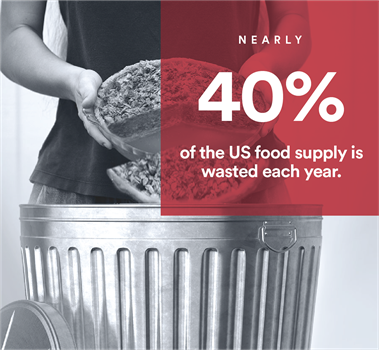Posted Sep 14, 2020

Meeting the people who bring fresh food to the market every week may make you consider all the hard work and dedication that goes into producing what we eat. But how much of that is for nothing? The reality is that 40% of the US food supply is wasted every year, and an estimated 40-50% of that food waste happens in our own homes. Food waste is a major ecological issue, not only wasting the Earth’s precious resources, but also leaving behind an enormous carbon footprint.
As consumers, there are plenty of small lifestyle changes we can make in the fight against food waste. To get you started, here are eight tips to reduce food waste at home.
Plan ahead
The most import action in fighting food waste at home is to nip the problem in the bud by only purchasing what we can eat. Try planning meals for the week before grocery shopping and write a list of exactly which ingredients you’ll need and how much. Make things easier by splurging on a special item and finding creative ways to stretch it into multiple meals.
Store food correctly
To increase food longevity, different items need to be stored in different ways. Learn about best practices for storing different types of fruits, vegetables, and herbs. There are also specific spaces in your refrigerator where certain foods should be kept, and rearranging it is the perfect excuse for a clean out.
Keep your kitchen organized
Speaking of clean outs, organize your fridge and pantry regularly to know what you have in stock, and maybe even discover some gems that are just waiting to be used. Once everything has been sorted, take a picture with your smartphone. It will come in handy when meal planning at work or while at the grocery store.
Learn how to tell if food has gone bad
Any pantry or fridge cleanup will likely bring the discovery of some items that are old but have potential. Learn about different use-by and expiration dates, and check out different guidelines on how long foods will last in the fridge.
Broaden your repertoire
So much food is also wasted when we toss out produce offcuts (think fruit skins and vegetable tops), and things that have almost, but not yet, gone bad. There are plenty of creative ways to use fruit and vegetable odds and ends and items that are past their prime, such as in smoothies, sauces, jams, and stews. This is what growers and manufacturers do with second-grade produce, and it’s what we as consumers should do too.
Freeze!
If this area of your kitchen is home to freezer-burned ice cream and pizzas, first give it a good clean. Then learn what kinds of foods freeze well, and how to prepare them. Cook larger batches of foods like chili, stews, and pasta sauce and freeze the leftovers for later—they make great meals that are easy to prepare on busy evenings.
Share!
Old habits are hard to break, and sometimes we just end up with too much. If you’re struggling with a surplus, why not share it with others by offering it to neighbors, friends, and family nearby? Or get in touch with food banks and other charities, who are also happy to receive donations of certain types of food. If it’s difficult to find people nearby who are interested, try a food sharing app like OLIO.
Start composting
Despite our best efforts, some food waste is still inevitable. Don’t beat yourself up. Instead, recycle those nutrients back into the Earth by transforming them into life-giving soil through composting. There are now plenty of different ways to compost, even for those of us who don’t have a large backyard, or even a balcony.
Whether you incorporate these kinds of changes all at once or gradually over time, reducing food waste at home doesn’t have to be difficult. And don’t forget about the financial savings that come with buying less and using what you have—a great bonus too!
About the author
Shannon Bergstrom is a LEED-accredited, TRUE waste advisor. She currently works at RTS, a tech-driven waste and recycling management company, as a sustainability operations manager. Shannon consults with clients across industries on sustainable waste practices.
This blog post is sponsored by RTS. Learn more about sponsorship opportunities with Green City Market, and email giving@greencitymarket.org to get in touch with our partnerships team.